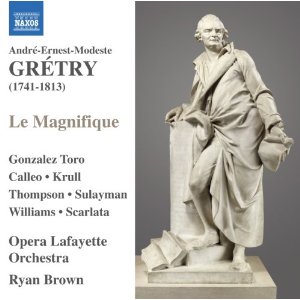Belgian-born André Grétry was a graceful tunesmith and fine craftsman; if his operas lack genius, they abound in charm. Le Magnifique, from 1773, is a comic work, and this recording, which eliminates all of the dialogue (a thorough synopsis is included) is delightful. You may not remember the melodies when it’s over, but you’ll have a good time while you listen.
The plot: As the opera opens, fanfares are greeting captives who were kidnapped nine years earlier; they include Florentine merchant Horace and his servant Laurence. Octave, a rich do-gooder known as Le Magnifique, bought them their freedom and is in love with Clementine, Horace’s daughter, who was raised by a tutor, Aldobrandin, who intends to marry her. Octave even gives up his prize horse to Aldobrandin in exchange for a chance to speak with Clementine alone. At the end, we discover that it was Fabio, Aldobrandin’s servant, working under his master’s orders, who sold the pair. The bad guys run away while Clementine and Octave receive Horace’s blessing to marry. It’s all frothy and light.
The cast features three tenors, well-differentiated. The villainous Fabio is sung by character tenor Karim Sulayman, who sounds anything but villainous—he resorts to a zany falsetto at times and always adds color to the ensembles. As the heart-throb Octave, Emiliano Gonzalez Toro sings smoothly and with ingratiating tone. Aldobrandin is sung by Jeffrey Thompson: you get the feeling that he’s over-acting, yet his voice is attractive and he inflects the text with cunning. The finales to Acts 1 and 2 feature only the three tenors!
Elizabeth Calleo is a lovely Clementine; while her second-act “Quelle contrainte” is a bit sweet, she shines elsewhere, particularly in her first-act duet with Margaret Krull’s Alix, who is her governess. Krull is the cast’s most impressive singer and she’s wonderfully moving in her duet with Laurence, her long-kidnapped husband, sung by Douglas Williams.
This bon-bon is led by Ryan Brown with just the right combination of pathos and wit, and the Opera Lafayette Orchestra is a commendable period-instrument group unafraid of vibrato and other non-HIP practices. Is this a necessity in your collection? I doubt it, but it fills in some blanks in 18th-century repertoire, and we’ll probably never hear a more honest performance.
































